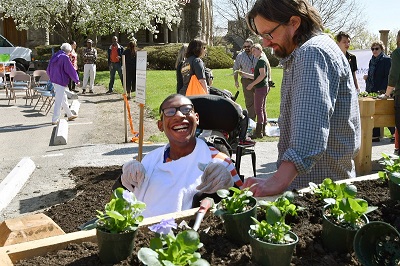Pittsburgh – May 1, 2018 – Government, nonprofit and faith leaders gathered today in Shadyside to open the City of Pittsburgh’s first ADA-accessible community flower garden. This new Western Pennsylvania Conservancy-owned community flower garden, located at the First United Methodist Church of Pittsburgh, will provide and expand gardening opportunities for people with disabilities or other physical limitations.
Along with event attendees, eight students from The Day School at The Children’s Institute of Pittsburgh placed the first flowers, nearly 100 blooming pansies, within the six raised wheelchair-accessible flower beds located at the site. These raised beds are connected by crushed limestone rock pathways that align the garden. An expansion of the existing community flower garden at this site, this new Accessible Flower Garden will feature various native perennials and annuals that will provide colorful blooms during growing seasons. A $28,000 grant from the Allegheny Regional Asset District funded the expansion to make the garden accessible.

“RAD places a high priority on making sure that regional assets are for everyone and encourages the assets to make accommodations for those who otherwise would not be able to participate,” said Daniel J. Griffin, Board Chair of the Allegheny Regional Asset District. “For many years, RAD has provided grants to improve spaces with accessible doors, restrooms and playgrounds. We’re thrilled to help fund this new accessible garden that eliminates barriers and makes it possible for people of all abilities to garden together.”
As part of their outdoor classroom and nature curriculum, students from the institute will make regular site visits to assist the garden steward, Deb Shearer, with ongoing care, planting and weeding during the current and upcoming school years. The Children’s Institute of Pittsburgh CEO Wendy Pardee said it was a natural fit for their students to get involved in this project.
“As an organization whose mission is driven by the needs of special children, we celebrate the opening of Pittsburgh’s first ADA-accessible garden beds and look forward to our Day School students helping to maintain them,” said Pardee. “Working at this garden site will not only provide a form of physical therapy and real-life instruction for our students, but it will also lend them a tangible connection to the soil, the seasons and the City of Pittsburgh. For that, we thank the Western Pennsylvania Conservancy, which has been a great partner to The Children’s Institute as we continue to look for ways to engage our students with the communities we all call home.”
The existing community flower garden was first established at this site by the Conservancy in 1996 and is financially supported by the church, RAD and UPMC.
Grant funding also was also used to purchase specialty gardening tools to help volunteers with disabilities, arthritis or other physical limitations. These tools, which include long-reach hoes, trowels and forks, are equipped with arm-support cuffs and easy-grip handles to make planting and accessing flower beds easier, convenient and safer. The tools are available for use by volunteers who want to plant at any garden site in Allegheny County.
“This is the first community garden of its kind in the City of Pittsburgh and we are extremely grateful to the church for making its property available for this undertaking,” said Tom Saunders, president and CEO of the Conservancy. “We are very appreciative to all of the project partners, but especially to RAD for funding this special venture and tools to ensure that people from all walks of life can enjoy the beauty, pride and comradery through community gardening.”
The Conservancy invites community members with disabilities and physical challenges to volunteer at garden planting and pull-out events each spring and fall. For more information about volunteering in this or any of the Conservancy’s 132 community gardens, please contact Lynn McGuire-Olzak at 412-586-2324 or gardens@paconserve.org.
###
Photos have been made available courtesy of the Western Pennsylvania Conservancy: https://we.tl/njQpdK2xyv
About the Western Pennsylvania Conservancy:
The Western Pennsylvania Conservancy (WPC) enhances the region by protecting and restoring exceptional places. A private nonprofit conservation organization founded in 1932, WPC has helped to establish 10 state parks, conserved more than a quarter million acres of natural lands and protected or restored more than 3,000 miles of rivers and streams. The Conservancy owns and operates Fallingwater, which symbolizes people living in harmony with nature. In addition, WPC enriches our region’s cities and towns through 132 community gardens and other green spaces that are planted with the help of about 12,000 volunteers. The work of the Western Pennsylvania Conservancy is accomplished through the support of more than 10,000 members. For more information, visit WaterLandLife.org or Fallingwater.org.
Media Contact:
Carmen Bray
Director of Communications
412-586-2358 (w)
cbray@paconserve.org
